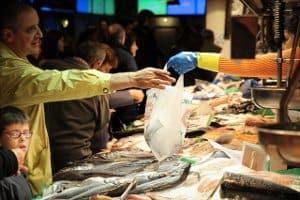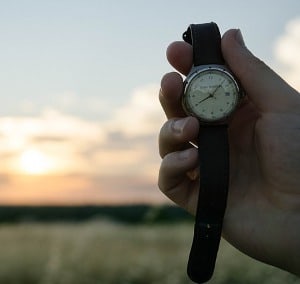“get” is a difficult verb for English students because it has lots of different uses and meanings.
We use “get”:
- as a main verb with many different meanings
- in several idioms (expressions) that are difficult to translate literally.
- in several phrasal verbs
Form
Present simple form
I get
you get
he / she / it gets
we get
you get
they get
ing form
getting
past form
got
past participle
got (British English)
gotten (American English)
gotten is incorrect in British English. Do not say it or write it.
“get” as a main verb
1) to get something = to receive something
If I get an object, it means that I receive an object.
Example 1: I got a belt for my birthday.

Example 2: It was Jane’s birthday and she got a bouquet of flowers.
2) to get something = to buy / obtain / fetch something
Another meaning of to get something is to buy something or to obtain something. To acquire something.
Example 1: She has gone to London to get some clothes.
Example 2: Mark is getting some fish at the market.

3) to get somebody something = to buy / obtain / fetch something for somebody
Here is the structure: to get + somebody + something
Example 1: They got Clare a hat for her birthday.
Example 2: Jane got Mark a watch for Christmas.

4) to get somewhere / event = to arrive somewhere
Example 1: I’m in London. I got here yesterday.

Example 2: Martin got to the meeting at 3 o’clock.
5) to get a train / bus / flight / taxi = to take / catch (transport)
Example 1: I got the bus this morning.
Example 2: He is getting a taxi.
6) to get something = to understand something
Example 1: Sarah is trying to do her English homework but she doesn’t get the question.
Example 2: I’m not laughing because I don’t get the joke.

7) get + adjective = to become (progressive change)
Example 1: When Jane arrived, she was warm but now she is getting cold.

Example 2: Clare has been working for 10 hours without a rest. Now she is getting tired.
____________________________________________________________________
“get” in phrasal verbs
1) to get on = to enter a train / bus / aeroplane / ship
Example : He is getting on the train.
2) to get in = to enter a car / taxi / small boat / building / room
Example 1: Mark is getting in the taxi.
Example 2: “Sarah, get in the house please!”
3) to get off = to leave a train / bus / aeroplane / ship
Example : She is getting off the train.

4) to get out of = to leave a car / taxi / small boat / building / room
Example 1: Mark is getting out of the taxi.
Example 2: Mark is getting out of the office.
5) to get up = to leave the bed and start the day.
Example: Jane gets up at 7 o’clock every day.
6) to get on well with somebody” = to have a good relationship with somebody
Example: Caroline and Sarah are friends. We can say: “Caroline gets on well with Sarah.”
7) to get somebody to do something = to persuade somebody to do something.
Mark got me to play football with him.


NoorHuda says
Thank u Andrew for this very very informative lesson on use of “get”. This is helping..!!!
Leda Laste Cansi says
Congratulations for your website, Andrew! I liked it very much! I am from Brazil and I’m studying English by myself. Your lessons are very useful to me! Thanks!
Géssica Sá says
Jog job Leda, your english is amazing
Jot says
Thanks a lot Andrew ,for your english lessons ,specially about the information of using “get” in differnt situations .now i got it ,how to use it. Thanks again and congrates for your website!
moamen says
Andrew really u r so smart the best site too useful
adrian zamfirescu says
1. I am going to get oranges at the supermarket.
2. I got up this morning at 7 o’clock.
3. I get on well with my friends.
Mohamed says
Before I read this article I did not ubstand the used of verb get but now it got clear.
Mohamed says
Before I read this article I did not understand the uses of verb get but now it got cleared.
Sorry for typing mistake in the previous comment.
Thanks a lot Andrew.
Linda Mthembu says
(1).I am going to get a grocer at the supermarket
( 2 ) I did get up at 6 o’clock this morning
( 3 ) I do get well with Billy
Linda Mthembu says
Thanks Andrew for this important information you shared with us
Williamwem says
Appreciate you sharing, great forum topic.Thanks Again. Want more. Barkman
Michele says
very interesting lesson about the verb “To get”.I didn’t know when to use to get on (Train) or to get in (a car),maybe it depends on what we are talking ,a big or small means of transport ..not sure..Thank teacher Andrew for helping us.
Houda says
Thank you a lot Andrew , really it’s good lesson and now I can use the verb get .
Ok my reply for this exercise :
1) I am going to get a fesh at the supermarket .
2) I got up at 4 a.m
3) I get on well with Asma .
R.Sivakumar says
The explanation was very helpful to me. Please give more and equal explanation(theory level), we can take notes before video lesson.
Fadi. says
Thank you for all .
Rajpal says
Oh! It’s really great to learn here on your website. I’m from India.
Tuan Hoang says
The lesson is very useful.Tks so much